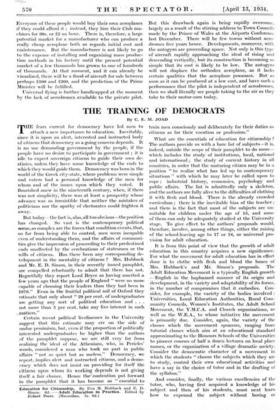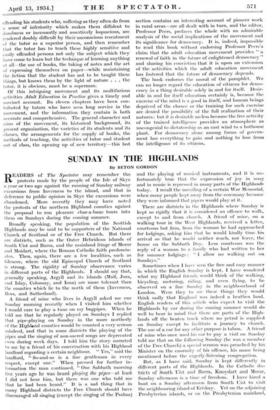THE TRAINING OF DEMOCRATS
By C. E. M. JOAD
THE fears current for democracy have led men to attach a new importance to education. Inevitably, since it is upon an alert, interested and instructed body of citizens that democracy as a going concern depends. It is no use demanding government by the people, if the people have no desire to participate in government ; it is idle to expect sovereign citizens to guide their own de: stinies, unless they have some knowledge of the ends to which they would guide them. Democracy was born in the world of the Greek city-state, where problems were simple and voters had a personal knowledge of the men for whom and of the issues upon which they voted. It flourished anew in the nineteenth century, when, if there was not simplicity, there was at least a prosperity whose advance was so irresistible that neither the mistakes of politicians nor the apathy of electorates could frighten it away.
But today—the fact is, alas, all too obvious—the position has changed. So vast is the contemporary political scene, so complex are the forces that condition events, that, so far from being able to control, men seem incapable even of understanding them, and the affairs of communi- ties give the impression of proceeding to their predestined ends unaffected by the cerebrations of statesmen or the wills of citizens. Has there been any corresponding de- velopment in the mentality of citizens ? Mrs. Hubback and Mr. E. D. Simon, in their recently issued pamphlet, are compelled reluctantly to admit that there has not. Regretfully they report Lord Bryce as having asserted a few years ago that the people of England "were no more rapable of choosing their leaders than they had been in 1870." Even in the fruitful political soil of .Oxford they estimate that only about " 20 per cent. of undergraduates are getting any Sort of political education and . . . not more than 5 per cent. take any live interest in such matters."
Certain recent political livelinesses in the University suggest that this estimate may err on the side of undue pessimism, but, even if the proportion of politically interested undergraduates be higher than the authors of the pamphlet suppose, we are still very far from realizing the ideal of the Athenians, who, in Pericles' words, considered a man who took no part in public affairs "not as quiet but as useless." Democracy, we repeat, implies alert and instructed citizens, and a demo- cracy which does not insist on providing for itself the citizens upon whom its working depends is not giving itself a fair chance. Hence the'contention put forward in the pamphlet that it has become as "essential to Education for Citizenship. By Eva M. Hubback and E. D. ' Simon. Bd.—Adult Education in Practice. Edited by Robert Peers. (Macmillan. 7s. Od.) train men consciously and deliberately for their duties as citizens as for their vocation or profession."
What are the essentials of education for citizenship ? The authors provide us with a bare list of subjects—it is, indeed, outside the scope of their pamphlet to do more— which includes the study of institutions, local, national and international ; the study of current history in all countries, in order that the maturing citizen may be in a position "to realize what has led up to contemporary situations" with which he may later be called upon to cope ; industrial history, economics, psychology and public affairs. The list is admittedly only a skeleton, and the authors are fully alive to the difficulties of clothing it with flesh and blood. There is the already crowded curriculum ; there is the inevitable bias of the teacher ; and there is the fact that most of the subjects are un- suitable for children under the age of 15, and some of them can only be adequately studied at the University stage. To give effect to the authors' proposals would, therefore, involve, among other things, either the raising of the school-leaving age to 17 or 18, or universal pro- vision for adult education.
It is from this point of view that the growth of adult education in this country acquires a new significance. For what the movement for adult education has in effect done is to clothe with flesh and blood the bones of Mrs. Hubback's and Mr. Simon's proposals. The Adult Education Movement is a typically English growth —English in the haphazard manner of its origin and development, in the variety and adaptability of its forms, in the number of compromises that it embodies. Con- sider, for example, the variety of the bodies involved : Universities, Local Education Authorities, Rural Com- munity Councils, Women's Institutes, the Adult School Movement, the Y.M.C.A. and Church organizations, as well as the W.E.A., to whose initiative the movement is primarily due. Consider, again, the variety of the classes which the movement sponsors, ranging from tutorial classes which aim at an educational standard approximating to the Honours Schools of the Universities to pioneer courses of half a dozen lectures on.local place names, or the organization of a village dramatic society. Consider the democratic character of a movement in which the students "choose the subjects which they arc to study, control their own educational activities and have a say in the choice of tutor and in the drafting of the syllabus."
And consider, finally, the various excellencies of the tutor, who, having first acquired a knowledge of his subject and then of his students, must next learn how to expound the subject without boring or offending his students who, suffering as they often do from a sense of inferiority which makes them diffident to dumbness or incessantly and assertively loquacious, are rendered doubly difficult by their unconscious resentment of the tutor as a superior person, and then remember that the tutor has to teach these highly sensitive and easily offended persons not only the subject which they have come to learn but the technique of learning anything at all—the use of books, the taking of notes and the art of expressing themselves on paper—while maintaining the fiction that the student has not to be taught these things, but knows them by the light of nature . . . the tutor, it is obvious, must be a superman.
Of this intriguing movement and its multifarious activities Adult Education in Practice gives a timely and succinct account. Its eleven chapters have been con- tributed by tutors who have seen long service in the movement, and the information they contain is both accurate and comprehensive. The general character and aims of the movement, its historical background, its present organization, the varieties of its students and its classes, the arrangements for the supply of books, the methods of teaching, the activities of tutor and student out of class, the opening up of new territory—this last section contains an interesting account of pioneer work in rural areas—arc all dealt with in turn, and the editor, Professor Peers, prefaces the whole with an admirable analysis of the social implications of the movement and its significance for democracy. It is, indeed, impossible to read this book without endorsing Professor Peers's claim that the adult education movement provides "a renewal of faith in the future of enlightened democracy" and sharing his conviction that it is upon an extension of the activities. which the adult education movement has fostered that the future of democracy depends.
The book endorses the moral of the pamphlet. We can no longer regard the education of citizens for demo- cracy As a thing desirable solely in and for itself. Desir- able in and for itself education certainly is, because the exercise of the mind is a good in itself, and human beings deprived of the chance or the training for such exercise are denied the possibility of the full realization of their natures: but it is desirable no less because the free activity of the trained intelligence provides an atmosphere as uncongenial to dictatorship as an east wind to a hothouse plant. For democracy alone among forms of govern- ment has everything to gain and nothing to lose from the intelligence of its citizens.

















































 Previous page
Previous page